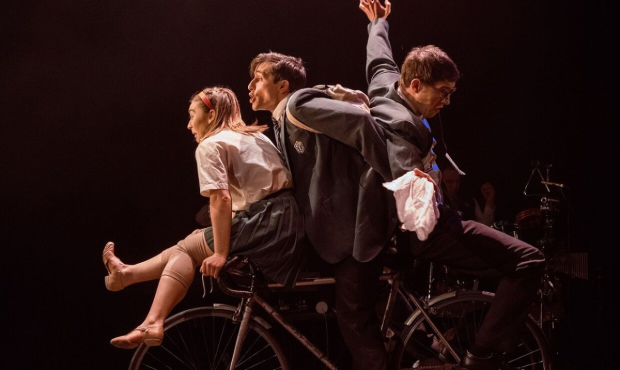Review: The Nature of Forgetting (Shoreditch Town Hall)
Theatre Re’s show, which explores the nature of memory and early-onset dementia, comes to Shoreditch

© Danilo Moroni
What is memory? It's the sort of loose question that everyone has a different answer to – for some it could an assortment of experiences, for others a series of life stages or scenes mentally played out. But most agree that to lose it, to forget, is a sad thing – a grievance to be avoided at all cost.
Theatre Re's newest show The Nature of Forgetting, which comes to London as part of an extensive UK tour, goes some way to explore these ideas by following Tom, a man grappling with early onset dementia. The company of four actors and two musicians whirl through Tom's life, his school day crushes, his heady wedding day, the heartwrenching tragedies that he experiences later in life. But for Tom, and the show, these memories are far from linear, and Tom's recollections are entirely subjective – the company have the same scenes replay, motivations change, figures disappear. Rose-tinted bliss can be transformed into thorny argument.
It's a discursive, furtive piece from Theatre Re, and the physical theatre ensemble do create some moments of wonder – a charmingly quaint bicycle ride, as romantic as anything Richard Curtis could ever have dreamt up, is brought to life evocatively with some tight movement work by performer and the play's director Guillaume Pigé.
The physical and movement sequences happening on stage are almost outshone by the work occurring behind, as two musicians, Alex Judd (also composer) and Keiran Pearson, create soundscape after soundscape, turning each rush and thrill of Tom's life into a sudden crescendo. When Tom's memory jars, so too does the music. As Tom struggles to regain his composure, so too do the musicians push to regain their sense of rhythm. The company move, articulate and perform as one. It's startling to behold.
But as vibrantly exciting as it is to watch, the conceptual exploration only goes so far, and while the repetitive strains of Tom's memories (slowly being warped by his dementia),
are brilliantly performed, the play ends up more cyclical than one would have wanted. You almost crave the company push further, explore the relationships Tom has with his peripheral family members and friends who, for the most part, feel like flotsam in a story orientated around the one man. His relationship with Isabella (an animated Louise Wilcox, revelling in the fact her character always seems to have one up on her beau) feels especially hampered by the piece's formal choices – for a show so occupied by matters of the heart, certain passages feel, sadly, heartless.
Tim Highman and Andres Velasquez's disparate set, particularly the use of bare wooden chairs and old clothes rails, provides multi-purpose versatility for a show that rarely stops moving.
Issues about dementia and the social impacts of the condition are slowly coming to the fore in the theatre world – The Nature of Forgetting is a fantastic boon to that movement. A thoughtful piece, aided by some faultless synchronicity and performance.



















